Volume no. 9, Issue 2
Without thinking, she picks up her bicycle and hoists it above her head, as if the man were a mountain lion who might be deterred by her superficial size.
Flash: Nicole Rivas, “Don’t Mention It”
▱
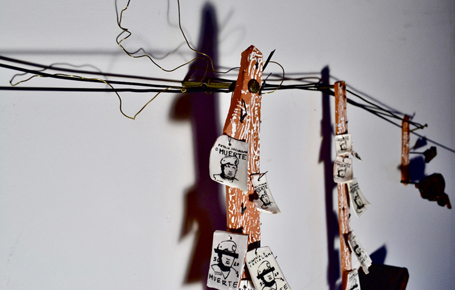
Visual Arts: Karina Mago, “The Monument Series”
▱
I don’t know why we call things that can’t speak “she.”
Creative Nonfiction: Martha Lundin, “Empty the Land”
▱
The lights in the waiting room were much harsher than the low, warm ones at the spa, and there were no sliced cucumbers in the complimentary filtered water. She stared at the pink and teal couches, a sort of sub-IKEA aesthetic, and wondered how many Americans would find her choices reprehensible, vilifiable. Sure, she was at least ending the pregnancy early, like most women who have abortions, but she was married. Hell, she was mostly happily married. And she was 30, the age when women are supposed to worry if they don’t have kids. And she wanted a kid, maybe, eventually. But right now she was depressed and just wanted to get drunk on wine and dance in her living room and sleep with other people and pay off her student loans and work on her art and not tank her career and maintain and grow her friendships and have her breasts stop hurting—and all of her observations indicated that those wants and needs were mutually exclusive with pregnancy.
Fiction: Molly Zapp, “Spa Treatments”
▱
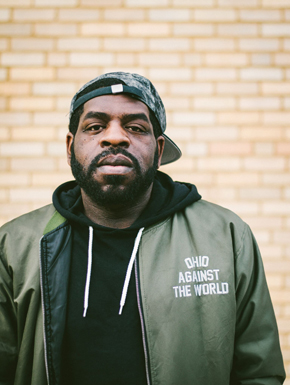
Interview: Hanif Abdurraqib
▱
Desecha pues la vida trashumante
el contraste de Dios con lo inhumano
la soberbia aladina del hermano
la verdad de la luz en el diamante
que hace de la razón lo cotidiano
en este mundo a paso de elefante
que se aleja del sol sin dar la mano
a la canción que suena desde antes.
Translation: Francisco Henriquez Rosa, “Sonetos del Apocalipsis”
Discard, then, the vagabond life,
the contrast of god with what’s inhuman,
the superb Alladin of brotherhood
the truth of light in a diamond
that makes daily use of reason
in this elephant-paced world,
distancing itself from the sun without farewell
to the song that sounds since the beginning.
Translation: Ariel Francisco, “Sonnet for the Apocalypse”
▱
I glance to the rafters. It’s where our operative’s fortified. He’s found the opening for his weapon, slipped the muzzle through the loophole … I suppress my laughter. Another fucking loophole.
I could wax poetic about the infinite ways to twist the meaning of that word. A freaking loophole in the election process got us here to begin with and hell, one in my very DNA got me—
The music starts.
My back stiffens.
Rafter’s job is to kill the President. Mine is to kill Rafter before he’s caught and questioned. I doubt he knows about that part of the plan. Hell, for all I know I’m in someone’s crosshairs too. But I took an oath and today I’ll fulfill it. It’s my patriotic duty.
Fiction: Andrea Goyan, “The President’s Girl”
▱
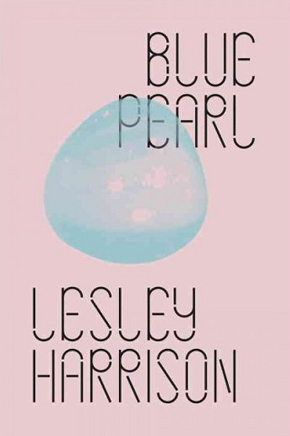
The pleasure and paradox of these seamless poems is that they feel unfiltered, full of pure hearing—an environmental recording that acknowledges human history yet gives place the last word.
Review: Lesley Harrison, “Blue Pearl”
▱
As she spoke these words as herself/as H, M felt herself receding even further away from herself; it was a kind of dispossession: a child’s hand removing finger by finger another child’s hand that holds tightly onto a branch from which it is hanging.
Flash: Meher Ali, “The Visit”
▱
I keep drawing and drawing until I reach the Samkaup store. The sight really is spectacular. That green color, rippling, illuminating the street. I think of all the things that happen once in a lifetime, a parent’s death, a baby’s birth. Antarctica as it once was. Virginity, lost. The possibilities really stir me.
Flash: Hannah Pass, “A Bend in the Night”
▱
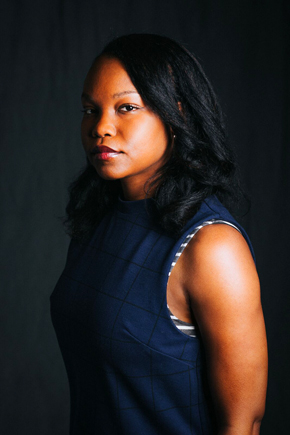
Interview: Nafissa Thompson-Spires
▱
what song into the child’s ear subtracts an animal’s
forage end to end the wrong leaves have been
eaten each absent correspondence bleats
you misinterpret the animal’s mouth
Poetry: Sara Lupita Olivares, “Night”
▱
The sun is mist in dozens of movie memories.
Full of lack is called longing in some corners.
If I am sentimentally dangerous
It’s just an inner mess resembling trouble.
Poetry: Terrell Jamal Terry, “Citrine Ash #12 (At Noon, Near New Fire)”
▱
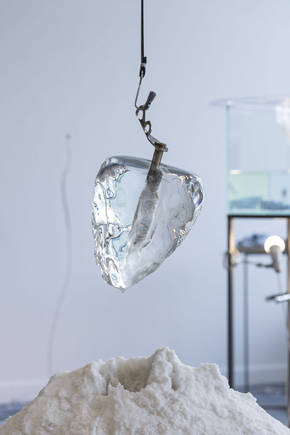
Visual Arts: Hannah Rowan, “Iceline Cartographies” & more
▱
In a place like Cabazon, inspiration matters. Unless one can envision higher things—greater possibilities and potentials—stagnation and the resulting inertia can settle like dust in a parched soul. Unfortunately, The Church of the Living Waters imparted not lofty thoughts but instead the feeling of being inside a bomb-proof fortress. Less than 50 yards to the north, a wide ribbon of black and gray—known as Interstate 10—cut through the region, carrying a steady stream of cars and trucks spewing noise and pollution 24 hours a day. The parishioners looked at it with accidentally-greedy eyes when they came for the Sunday morning service. They forgot they weren’t supposed to be thinking of escape routes.
Creative Nonfiction: Starlene Justice, “The Thin Veil”
▱
Ni los vientos del norte, ni los calores de fragua que rezumaban las tardes, ni los remolinos de polvo que se trenzaban en los empedrados, en las calzadas. Nada nos contenía: ni las caídas por los pavimentos húmedos, ni los derrapes por la arenisca en las cunetas; mucho menos las salpicaduras de barro sobre la ropa. Nadie nos impedía montar en las bicicletas para lanzarnos a las exploraciones. Pedaleábamos para eludir las malicias de los hermanos mayores y ausentarnos durante las visitas de las tías solteronas que no escatimaban en consejos; huíamos para evitar reprimendas y estremecernos con las ráfagas húmedas sobre nuestros rostros.
Ahora que descubro en el garaje la bicicleta corroída, que me cuentan en el café que edificarán bloques de casas en los suburbios del sur, ahora que leo la noticia sobre un hombre de mi edad que tramó durante años degollar a su padre, lo recuerdo, precisamente cuando por estos días las tormentas eléctricas fisuran los cielos y los chaparrones han anegado las riberas de los ríos de la comarca.
Translation: Carlos Vadillo Buenfil, “En los labios de los vivos”
Neither the northern winds, nor the oozing heat in the afternoons, nor the swirls of dust that were woven in the cobblestones on the driveways. Nothing contained us: neither the falls by the wet pavements, nor the sandstone drifts in the ditches, much less the mud splashes on our clothes. Nobody prevented us from riding our bikes and launching ourselves into exploration. We pedaled to avoid the malice of the older brothers and to make ourselves absent during the visits of the spinster aunts who did not skimp on advice. We fled to avoid reprimands and shudder with the wet gusts of wind on our faces.
Now that I discover in the garage the corroded bicycle, they tell me in the cafe that they will build housing blocks in the southern suburbs. Now that I read the news about a man my age who plotted for years to behead his father, I remember it, precisely these days when thunderstorms fissure the skies and showers have flooded the banks of the rivers in this region.
Translation: Leonel Manzanares de la Rosa, “On the Lips of the living”
▱
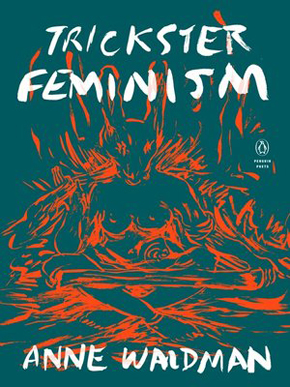
These poems are witty, clear-sighted, magical, and active cuttings of history. These moments are a mural of events, where life is always changing, political problems persist, people are oppressed, things aren’t always what they seem.
Review: Mash Waldman, “Trickster Feminism”
▱
already the body managing | systems crooning in unison
this is just the beginning | shortly I began to be more
alone | lately sleeping naked to release more venom
afraid it would then leech back into the poison world
if I can be a filter for the future I will be | kidney or lymph
at least a catalytic convertor | make a bad thing a little less
so | still just there in the bad skin & skeleton performing
test site or the handwashing bop | no longer advancing
Poetry: Ben Doller, “Room”
▱
The next morning, Mom is crying. She says she’s happy. Dad says she’s all over the place because she’s pregnant again.
A week later I turn 11 and am one of twenty kids who get to sled down the hill behind school on the last freak snow day, the last year we can do it before they put in the new motel.
It’s the year when Grandpa dies from a farm accident, a month after bringing me back to the pond in the summer to teach me to doggy paddle. He had helped my dad with the first week of haying. The friction from the belt on the baler caught fire and blew the ramrod off. It hit my grandfather as he walked over to examine it.
Fiction: Joshua Wetjen, “Flip Turn”
▱
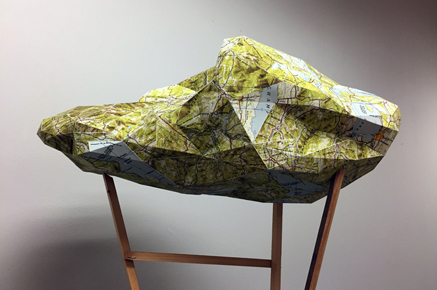
Visual Arts: Kevin Curry, “Kaibab Trail” & more
▱
you don’t need to walk through the desert
see with your mouth instead | the outer edge of the camp tooth
lit like bright bezel licked by sharp eyed girls
Poetry: Montreux Rotholtz, “Frequency”
▱
Hvis du gik fra mig
ville det være for
den mindste ting
et rynket øjenbryn
og det er det jeg frygter.
Translation: C. Y. Frostholm, from “Mellem Stationerne”
If you left me
it would be for
the smallest thing
a frown
and that’s what I’m afraid of.
Translation: Karen Havelin, from “Mellem Stationerne”
▱
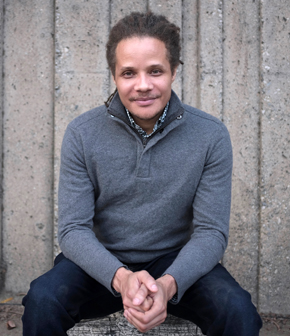
Interview: Jamel Brinkley
▱
There is an urn on the table, containing her husband. She spreads peanut butter across some bread and cracks open a can of pop. The urn is taking on a stripe of sun. She has lived here for 26 years and knows that by the time she finishes the sandwich the urn will be shaded again.
Flash: Molly Sturdevant, “The Nail”
▱
существуют такие сюжеты, которые не подлежат пересказу.
Невозможно правдиво описать смертные чувства, смертельные, смертоносные.
Translation: Elena Fanailova, “Балтийский дневник”
there are such plots which are not to be retold.
It’s impossible to truthfully describe the feelings, deadly, lethal.
Translation: Andrey Gritsman, from “The Baltic Diary”
▱
As he got farther from the river and closer to the patch of huckleberry bushes, his pulse picked up. He’d seen them here yesterday and dreamt of them last night, a lovely dream, so lovely, too lovely it made him suspicious, so when he woke up this morning, he doubted what he’d seen was true. He parted the bushes. Nothing. Nothing but emptiness. The depth of his disappointment surprised him as if he’d lost something vital and meaningful. The age-old feeling of not being the right fit for this world rushed in, coating his brain with sludge. He didn’t want to go back to his clan or hear any more suggestions from Rafa. He plopped down on the dirt. Some of his best creative moments had come from being alone under a tree. But there was a fine psycho-emotional line between solitude and loneliness, as fine as a crack in a piece of clay pottery.
Fiction: Nina Schuyler, “The Season of Change”
▱
There is no mirror here you can use to scrutinize and criticize your body. Instead you move around, scantily clad, with a growing awareness of how good you feel. How healthy. And how amazing this is, as you careen toward middle age.
Creative Nonfiction: Lindsey Clark, “Uoleva”
▱
Six stories of steel and concrete, slathered with lead paint, dripping PCBs. An acre of storage packed with asbestos: a giant snow globe not to be shaken. An open pit filled with old tires and murky water. Crushed ore, spent but still fibrous, piled high at the river’s edge. The things I have seen, Daughter. The things I’ve seen.
Flash: Scott Drew, “The Things You Will See”








